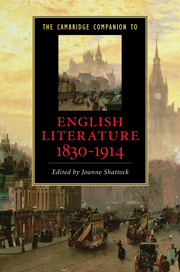Book contents
- Frontmatter
- Introduction
- Part 1 Modes of writing and their contexts
- 1 Authors and authorship
- 2 Readers and readerships
- 3 Life writing
- 4 The culture of criticism
- 5 Women’s voices and public debate
- 6 Writing the past
- 7 Radical writing
- 8 Popular culture
- Part II Intersections and incursions
- Part III The centre and the periphery
- Guide to further reading
- Index
3 - Life writing
from Part 1 - Modes of writing and their contexts
Published online by Cambridge University Press: 28 November 2010
- Frontmatter
- Introduction
- Part 1 Modes of writing and their contexts
- 1 Authors and authorship
- 2 Readers and readerships
- 3 Life writing
- 4 The culture of criticism
- 5 Women’s voices and public debate
- 6 Writing the past
- 7 Radical writing
- 8 Popular culture
- Part II Intersections and incursions
- Part III The centre and the periphery
- Guide to further reading
- Index
Summary
Although Edmund Gosse (1849-1928) was raised to follow a divine calling in the Plymouth Brethren and strove to be a great poet, he is most remembered today for the vivid memoir Father and Son (1907). His father Philip Gosse (1810-88) was a popular zoologist and fundamentalist pastor whose ill-received book, Omphalos (1857), sought to forestall the theory of evolution by reconciling fossil evidence with the account of creation in Genesis (it was published two years before Darwin’s Origin of Species). Father and Son vividly evokes Edmund’s childhood with his dying mother and grieving father. It is a narrative of self-development, capturing a characteristically Victorian loss of faith in established authorities. Edmund Gosse’s own authority as a critic and biographer was challenged by the standards of the new era, but in the early twentieth century few people appeared more representative of the literary establishment. And for our purposes, Gosse effectively introduces the changing aims of life writing as it developed from 1830 to 1914.
In the year of Queen Victoria’s death (1901) Gosse wrote a pivotal article, 'The Custom of Biography'. It begins with a satire on Victorian funereal biographies: 'there must be a pall, two volumes of biography, and a few wreaths of elegant white flowers'; the life writing section of the library resembles a bourgeois cemetery (195). Gosse urges some ambitious young man to write the neglected 'History of Biography in England'. Only around 1750 did the English overcome their distrust of ‘memoirs’ as fiction or falsehood and gain an ‘interest in the life of an individual … In the vast flight of locusts … how can one care to take up a solitary insect and study its legs and wings?’ Few biographies of ‘private people’ could be written before ‘the ages settled down to some personal comfort, and the movements of kings began to be regulated’ in modern times (196).
- Type
- Chapter
- Information
- The Cambridge Companion to English Literature, 1830–1914 , pp. 50 - 70Publisher: Cambridge University PressPrint publication year: 2010
- 3
- Cited by



